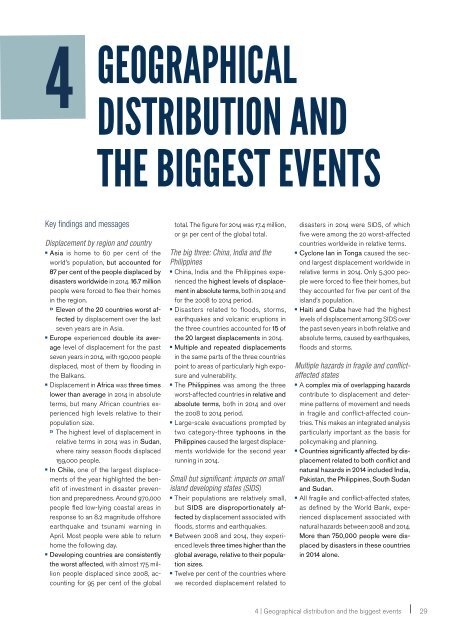Estimates
bzTPL9
bzTPL9
- No tags were found...
Create successful ePaper yourself
Turn your PDF publications into a flip-book with our unique Google optimized e-Paper software.
4GEOGRAPHICALDISTRIBUTION ANDTHE BIGGEST EVENTSKey findings and messagesDisplacement by region and countryAsia is home to 60 per cent of theworld’s population, but accounted for87 per cent of the people displaced bydisasters worldwide in 2014. 16.7 millionpeople were forced to flee their homesin the region.» Eleven of the 20 countries worst affectedby displacement over the lastseven years are in Asia.Europe experienced double its averagelevel of displacement for the pastseven years in 2014, with 190,000 peopledisplaced, most of them by flooding inthe Balkans.Displacement in Africa was three timeslower than average in 2014 in absoluteterms, but many African countries experiencedhigh levels relative to theirpopulation size.» The highest level of displacement inrelative terms in 2014 was in Sudan,where rainy season floods displaced159,000 people.In Chile, one of the largest displacementsof the year highlighted the benefitof investment in disaster preventionand preparedness. Around 970,000people fled low-lying coastal areas inresponse to an 8.2 magnitude offshoreearthquake and tsunami warning inApril. Most people were able to returnhome the following day.Developing countries are consistentlythe worst affected, with almost 175 millionpeople displaced since 2008, accountingfor 95 per cent of the globaltotal. The figure for 2014 was 17.4 million,or 91 per cent of the global total.The big three: China, India and thePhilippinesChina, India and the Philippines experiencedthe highest levels of displacementin absolute terms, both in 2014 andfor the 2008 to 2014 period.Disasters related to floods, storms,earthquakes and volcanic eruptions inthe three countries accounted for 15 ofthe 20 largest displacements in 2014.Multiple and repeated displacementsin the same parts of the three countriespoint to areas of particularly high exposureand vulnerability.The Philippines was among the threeworst-affected countries in relative andabsolute terms, both in 2014 and overthe 2008 to 2014 period.Large-scale evacuations prompted bytwo category-three typhoons in thePhilippines caused the largest displacementsworldwide for the second yearrunning in 2014.Small but significant: impacts on smallisland developing states (SIDS)Their populations are relatively small,but SIDS are disproportionately affectedby displacement associated withfloods, storms and earthquakes.Between 2008 and 2014, they experiencedlevels three times higher than theglobal average, relative to their populationsizes.Twelve per cent of the countries wherewe recorded displacement related todisasters in 2014 were SIDS, of whichfive were among the 20 worst-affectedcountries worldwide in relative terms.Cyclone Ian in Tonga caused the secondlargest displacement worldwide inrelative terms in 2014. Only 5,300 peoplewere forced to flee their homes, butthey accounted for five per cent of theisland’s population.Haiti and Cuba have had the highestlevels of displacement among SIDS overthe past seven years in both relative andabsolute terms, caused by earthquakes,floods and storms.Multiple hazards in fragile and conflictaffectedstatesA complex mix of overlapping hazardscontribute to displacement and determinepatterns of movement and needsin fragile and conflict-affected countries.This makes an integrated analysisparticularly important as the basis forpolicymaking and planning.Countries significantly affected by displacementrelated to both conflict andnatural hazards in 2014 included India,Pakistan, the Philippines, South Sudanand Sudan.All fragile and conflict-affected states,as defined by the World Bank, experienceddisplacement associated withnatural hazards between 2008 and 2014.More than 750,000 people were displacedby disasters in these countriesin 2014 alone.4 | Geographical distribution and the biggest events29


